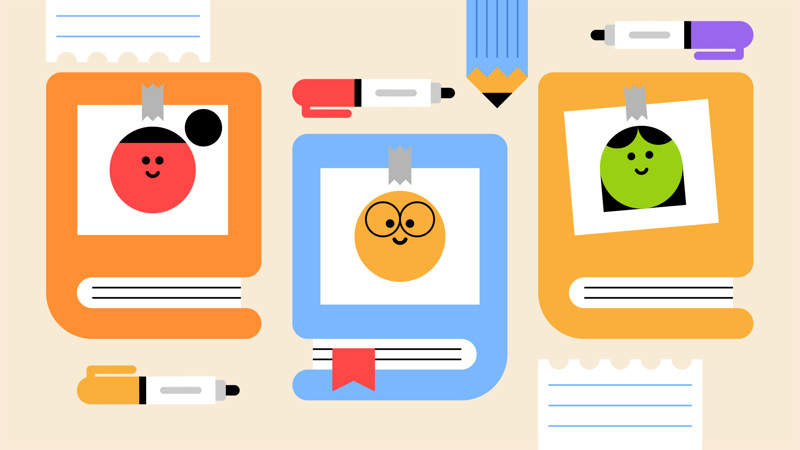
Weekly wins
You’ll need
- A4 paper
- A4 card
- Pens or pencils
- Hole punch
- Split pins
- Craft materials (for example, tissue paper, pipe cleaners, stickers)
Before you begin
- Use the safety checklist to help you plan and risk assess your activity. Additional help to carry out your risk assessment, including examples can be found on our safety pages.
- It’s best to make some sample diaries so everyone can see what they’re aiming for, and so you can practise making them.
How to make a diary
- Use the hole punch to make holes in the paper, and then put a treasury tag or split pin through the holes to bind the sheets. This is the diary insert.
- To make the diary’s cover, use the hole punch to make holes in two sheets of card. Put one sheet of card on top of the diary insert, placing the other behind it, so the paper is sandwiched between the card sheets. Then thread the tag or pin from the diary insert through the card’s holes to attach the cover.
- Write the owner’s name on the front of the diary and decorate it.
Dear diary
- The person leading the activity should explain that a weekly win is a planned act of kindness towards someone else.
- Everyone should make their diaries following the instructions above. Together, the group should decide how many weeks they’ll aim to keep their diaries for. This should help them decide how much paper to include.
- Everyone should plan three wins for the next week, meaning three ways they could be kind or helpful towards someone else. They should write one win on the top of the first, second and third pages.
- Everyone should think about how they could reflect on their win afterwards. They should leave themselves space to write down their reflections and add some prompts to each page, such as ‘What happened? When did it happen? Who did you help? How did you feel after?’ Again, remember to leave space to answer these questions too.
- Everyone should take their diaries home to fill out once they have completed their weekly wins. They can keep decorating them at home, and if anyone does a spontaneous win they could write about that too.
- Everyone should bring their diaries back to the next meeting. They should take it in turns to share as much, or as little, as they like about the wins they had.
- Everyone should continue to use their diaries to plan and reflect on their little wins. It could become a nice thing to look back on if they feel down, reminding them of all the ways they’ve made the world a brighter place.
Reflection
Making weekly win diaries was a chance for everyone to boost their wellbeing and think about what makes them happy. Did people find that having the diary made it easier to remember to do kind things? Did anyone have a spontaneous weekly win beyond what they’d planned to do?
How did recording their weekly wins make people feel? Was it nice to have a record of all the thoughtful things they’d done? Did anyone realise anything about themselves that they weren’t aware of before? For example, perhaps people realised they were excellent listeners, good at remembering what their friends liked, or great at noticing when someone seemed unhappy.
How could keeping a record of little wins (and other positive things) help people when they’re feeling down?
Safety
All activities must be safely managed. You must complete a thorough risk assessment and take appropriate steps to reduce risk. Use the safety checklist to help you plan and risk assess your activity. Always get approval for the activity, and have suitable supervision and an InTouch process.
- Scissors
Supervise young people appropriately when they’re using scissors. Store all sharp objects securely, out of the reach of young people.
- Glue and solvents
Always supervise young people appropriately when they’re using glue and solvent products. Make sure there’s plenty of ventilation. Be aware of any medical conditions that could be affected by glue or solvent use and make adjustments as needed.
If anyone’s feeling ambitious, they could try to achieve more than three weekly wins in the first week. However, remind everyone that this isn’t a competitive activity. The number of wins isn’t the most important thing, and people don’t need to worry about making grand gestures either. A small act of kindness can have just as much impact.
People should choose weekly wins that work for them – different people have different skills and ways of showing kindness and care, and that’s a good thing. It’s OK for everyone’s plans to be different. It’s great if some people are ready to take a step out of their comfort zone, but no one should feel pressured to push themselves too far.
All Scout activities should be inclusive and accessible.
If the group found this activity useful, think about how diaries could be used to record difficult or challenging experiences. This could be a useful resource to look back on at the end of the year to see how many challenges you’ve overcome and how much progress you’ve made.
Let everyone choose their own targets to aim for as their weekly wins.
